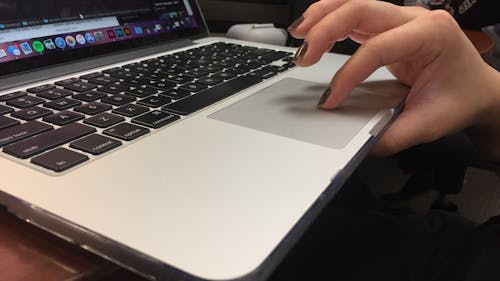Expert explains technology addiction

More than 150 medical professionals, students and advocates attended the seventh annual Urban Mental Health Conference at Rutgers New Jersey Medical School (NJMS) in Newark. The theme of this year’s conference was technology addiction.
Technology addiction is similar to substance abuse disorders and other behavioral addictions like sex and gambling, said Chair of the Department of Psychiatry at NJMS Dr. Petros Levounis. The cardinal symptom, in his opinion, is continuing to overuse technology despite knowing about the consequences.
“‘I know it’s bad for me, and I’m trying to cut down, but I can’t. I say that I will have some time for homework and I won’t play games, but I can’t stick to my own resolutions.’ That’s a sign that something may be going wrong,” he said.
For many, the symptoms are not severe. Only a very small subset of people will end up with some form of technology addiction, he said.
Levounis and other psychiatrists and specialists in addiction medicine tend to only see severe cases of technology addiction, but he said there is a gray area of people who do not meet the formal criteria of addiction and still experience problems and complications due to technology addiction.
While technology addiction is studied as a separate disorder, Levounis said that many addictions can come with mental illness. For example, he said that people who suffer from alcoholism have increased risk for anxiety and depression. But interesting relationships emerge when it comes to technology addiction, he said.
“People who suffer from internet gaming disorder have lower rates of alcohol use than the general population,” Levounis said. “Does that mean that internet gaming is a protective factor against alcoholism? Perhaps. It also may mean that people who are attracted to internet gaming are somehow less inclined to be using alcohol.”
Many of the patients who come in with technology addiction end up being depressed, anxious and sometimes overly irritable, Levounis said. Their professional and personal lives often suffer significantly from the addiction.
At the conference, Levounis was one of many panelists who presented on technological addictions like internet gaming, cybersex, social media and online auctions.
Particular issues with online auctions are often seen in elderly populations, he said. Technology addiction is not unique to the young population, Levounis said, but some stereotypes about millennials may be true.
“The idea is that millennials are as hardworking, motivated and ambitious as previous generations. It’s just that they are much more inclined to do the work on their own time than someone else’s schedule,” he said. “This is directly related to an explosion of technology that allows for more flexible schedules.”
Technology being a large part of everyday personal and professional life, Levounis said it is difficult to quantify technology addiction.
“You cannot put an hour limit on it. For a lot of people, technology isn’t just recreation. It’s a huge part of their everyday professional world and their livelihood,” he said. “Even a psychiatrist like myself, I find that I spend a significant amount of time in front of a screen. It’s more based on the consequence – you find yourself neglecting major responsibilities of life.”
Levounis suggested that students put space and time limits on technology, according to information from the American Academy of Pediatrics. He said many people have made the bedroom or dining room a technology-free zone, or have set aside time, such as during dinner, where they will not use their phones.
Every year, Levounis and his husband host a dinner party for his medical students with only one rule: no cell phones at the dinner table.
“This past summer was the first time the poor things couldn’t really help themselves. They would go to the bathroom to check their cell phones or I would catch them sometimes at the end of the table on their phones. I don’t think they meant any disrespect to me,” he said. “I think they just couldn’t help it – it was pretty frightening to me.”
While there are behavioral therapies available to help treat technology addiction, Levounis said he would like to see technology fight technological addiction.
“Why not take advantage of the attachment somebody has for technology to devise some interventions that will come through the internet and be able to teach people how to handle technology in a healthy way?” he said.
While the dark side of technology is addiction, Levounis said we cannot forget about the mental health benefits of technology.
“I’m thinking about the LGBTQ+ youth in the past who may have grown up in a highly homophobic environment without knowing anyone else who was gay and feeling incredibly isolated, alienated and depressed,” he said. “Now, finding a kindred spirit is only a click away. People have developed communities and support for each other and have improved people’s mental health in tremendous ways, in very real ways.”
Editor's Note: A previous version of this headline said "Rutgers—Newark professor explains technology addiction."



